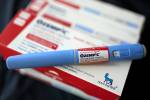Is fraud in your future? Protect yourself from medical identity theft
With millions of Americans slated to gain access to healthcare under the Affordable Care Act, many may find themselves unknowingly at risk for medical identity theft, a crime that costs the country $41.3 billion annually. In the United States, an estimated 1.5 million people have their ID stolen each year.
“It is a cruel twist on the traditional crime of personal identity theft,” says Jo-Ellen Abou Nader, senior director of Express Scripts’ Fraud, Waste and Abuse program. “When a person’s medical identity is stolen, they may find that false information is added to their personal health record such as a change in blood type or inaccurate allergies.”
Stolen medical identities often fuel another crime: prescription drug fraud and abuse. Thieves can use stolen information to illegally obtain prescription drugs and sell them on the secondary market. Illegal drug diversion costs the nation $73.5 billion each year, and prescription drug abuse is responsible for more deaths than heroin and cocaine combined.
Abou Nader offers the following tips to consumers to help fight against medical identity theft and fraud:
* Guard your card: Protect your medical identification card at all times and keep it in a safe and secure location. Some healthcare companies, like Express Scripts, have Fraud, Waste and Abuse programs in place to identify fake or forged prescriptions and other signs of fraudulent activities. If your card is lost or stolen, immediately alert your insurance company.
* Toss with caution: When throwing away prescription bottles and vials, remove the labels or black out your personal information so it is illegible. When throwing away documents containing protected health information, shred the documents instead of discarding them in the garbage.
* Protect your personal information: Be alert to impersonators or email phishing scams asking you for your personal information and never give out your passwords over the phone, internet, or via email. If you are unsure, call the company directly to inquire about the request.
* Be privy to privacy policies: Before agreeing to the privacy policies of anyone you do business with, read through their policies in detail to completely understand how your personal information will be used. If you have questions, request more information.
* Lock up your bottles: Keep your prescription bottles hidden or locked away, especially during the holiday season when you may have an increase in visitors that will have access to your personal belongings.
* Read your EOB Statements: It is important to carefully read any explanation of benefits (EOB) statements you receive from your health plan after treatment to make sure the services listed are accurate. Review the name of the provider, the date of service and the service provided. If it includes information that does not look familiar, be sure to immediately report it to your health plan provider.
For more information about how to protect yourself against medical identification theft, visit Express Scripts’ Healthcare Insights blog at http://lab.express-scripts.com/.























